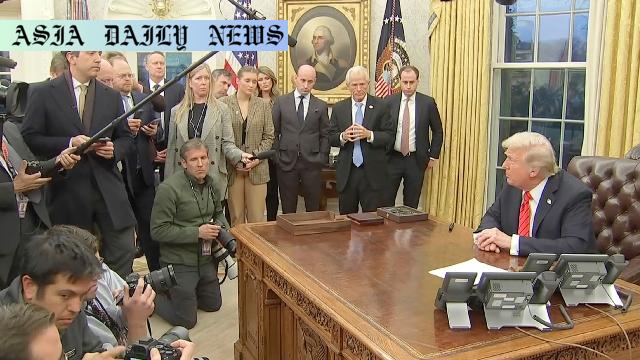Ceasefire: Trump remarks Israel has the discretion to cancel Gaza agreement, urging action if Hamas doesn’t release hostages by Saturday.
Trump suggests canceling the Gaza ceasefire unless Hamas releases all hostages by Saturday.
Hamas delays the latest planned hostage release, citing Israel’s alleged violations of the agreement.
Trump emphasizes Israel’s discretion but warns against continuing truce without resolution.

Trump Urges Israel to Reconsider Ceasefire
In a high-stakes remark this week, U.S. President Donald Trump suggested Israel should cancel its ceasefire agreement with Hamas unless all hostages held captive in Gaza are released by Saturday at noon. Speaking to reporters on Monday, Trump voiced strong concerns about Hamas’ failure to adhere to the terms of the ceasefire agreement, particularly their decision to delay the hostage release.
Hamas Delays Scheduled Hostage Releases
Earlier on Monday, the Islamic group Hamas announced it would postpone the release of three hostages that were set to be freed on Saturday. According to Hamas, this move was prompted by what it alleges are violations by Israel of the existing six-week ceasefire terms. The specifics of such violations were not explicitly disclosed by Hamas. Nonetheless, the announcement drew fierce reactions from both Israel and political leaders in the United States.
Trump’s Stance and Deadline
Trump’s proposition is clear. He implored Israel to strongly consider canceling the truce after Saturday if the hostages are not released. “As far as I’m concerned,” Trump remarked, “if all of the hostages aren’t returned by Saturday at 12 o’clock, I think it’s an appropriate time. I would say, cancel it, and all bets are off, and let hell break out.” These bold words underscore the leadership dynamics at play, with Trump calling for decisive action in the face of prolonged delays by Hamas.
The Ceasefire Agreement Under Threat
The six-week ceasefire agreement, originally intended to alleviate tensions, is now clinging to life after repeated allegations of violations from both sides. Under this agreement, multiple rounds of hostage releases were scheduled. However, with Hamas delaying the latest round, the fragile truce faces a severe challenge. Israel, for its part, has scarcely shown patience since Hamas’s announcement, signaling potential escalations in the ongoing crisis.
Potential Consequences of Canceling the Ceasefire
Should Israel heed Trump’s suggestion and abandon the ceasefire, the consequences could be dire. Such a move would likely reignite violence in Gaza, exacerbating an already precarious humanitarian situation. However, proponents of Trump’s approach argue that the ceasefire has proven ineffective if hostages remain in captivity and promises fail to materialize.
International Implications
The potential breakdown of the ceasefire holds ramifications not just for Israel and Gaza but for the broader region and international relations. The United States has historically played a pivotal role in mediating peace in the Middle East, and Trump’s remarks underline a more assertive, almost ultimatum-style approach. Nations allied with both sides are closely watching developments, concerned about potential instability in the region.
The Role of Dialogue and Negotiation
Experts suggest that dialogue and negotiation remain essential components of resolving the ongoing conflict. While Trump’s remarks may galvanize action, critics warn such aggressive rhetoric could hinder long-term peace-building efforts. Any resolution must delicately balance the immediate safety of hostages with the broader aspirations for sustained peace.
Conclusion
As the world watches the clock count down to Saturday’s proposed deadline, the stakes couldn’t be higher. With three hostages in limbo and Hamas delaying commitments, Israel faces mounting pressure. Trump’s intervention serves as a reminder of the urgency of the situation, but whether his suggestion will be heeded remains uncertain. The consequences of action—or inaction—could reverberate far beyond the borders of Gaza.
Commentary
High-Stakes Diplomacy or Impulsive Ultimatum?
Trump’s intervention in the Israel-Hamas ceasefire debate is emblematic of his distinctive style—decisive, bold, and unyielding. His remarks about canceling the truce reflect a high-stakes strategy: force Hamas into compliance or brace for intensified conflict. For his supporters, this approach will likely resonate as a much-needed call to action in a stalemated situation. However, the sheer volatility of the region raises pressing questions about whether such rhetoric offers a viable path forward.
Unintended Consequences of Breaking the Ceasefire
The threat to cancel the ceasefire is not without its risks. Should hostilities resume, the humanitarian cost could be catastrophic. Gaza already contends with immense crises, including displacement, food shortages, and limited access to healthcare. A return to violence could destroy years of incremental progress and plunge the region into unmitigated chaos. Thus, while Trump’s rhetoric demonstrates resolve, it also underscores the fragility of peace in the region.
The Need for Measured Diplomacy
In addressing conflicts of such magnitude, measured diplomacy often takes precedence over impulsive ultimatums. While Trump’s approach may pressure Hamas into honoring its commitments, there is always the danger it might escalate tensions. Would a more balanced and discreet approach yield better results, or is this bold strategy exactly what the situation demands? Ultimately, the balance between strength and prudence will be critical in determining the course of action.


